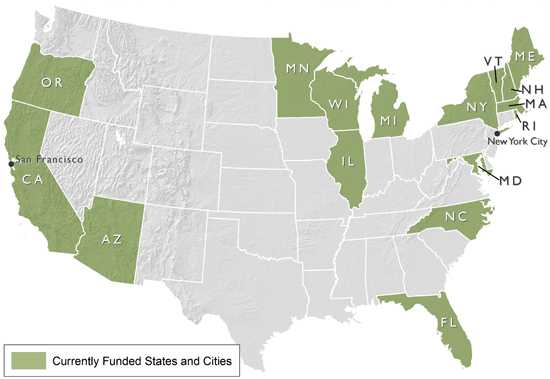Climate-Ready States & Cities Initiative Grantees

Arizona Department of Health Services
Health Impacts: Health effects due to extreme heat
California Department of Health
Illinois Department of Public Health (The Board of Trustees of the University of Illinois)
Maryland Department of Health and Mental Hygiene
Health Impacts: Asthma, heart disease, food-borne illness
Massachusetts Department of Health
Health Impacts: Water, food, and vector borne diseases, heat stress, hazardous weather events, respiratory diseases
Michigan Department of Community Health
Health Impacts: Heat related disease, respiratory disease
Minnesota Department of Health
Health Impacts: Extreme heat events, vector borne disease
New Hampshire Department of Health and Human Services
New York State Department of Health
Health Impacts: Extreme weather, waterborne, food-borne, and vector disease
New York City Department of Health and Mental Hygiene
Health Impacts: Heat-related morbidity and mortality, respiratory illness, water-borne and vector-borne disease
North Carolina Department of Public Health
Health Impacts: Temperature related morbidity and mortality; extreme weather; air pollution; water, food, and vector borne diseases
Oregon Department of Health
Health Impacts: Water and food borne diseases, extreme weather, ecosystems
Rhode Island Department of Health
San Francisco Department of Public Health
Health Impacts: Heat stress morbidity and mortality associated with air quality impacts
An Assessment of San Francisco’s Vulnerability to Flooding & Extreme Storms [PDF – 7 MB]
State of Maine Department of Health and Human Services
Health Impacts: Heat related outcomes, vector-borne disease
Wisconsin Department of Health Services
For more information on CDC’s Climate-Ready States & Cities Initiative please feel free to send an e-mail to: climateandhealth@cdc.gov
- Page last reviewed: April 14, 2016
- Page last updated: June 19, 2017
- Content source:


 ShareCompartir
ShareCompartir